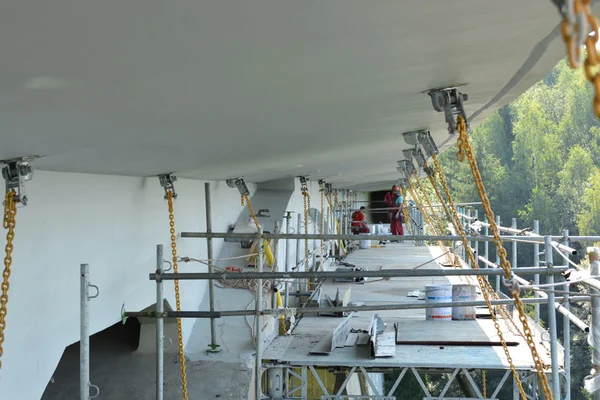Germany
Four bridges on the A 42 motorway at the Duisburg-Nord junction had to be repaired. General supply bottlenecks during the coronavirus pandemic and a short construction period made the rehabilitation work a real challenge. Products from MC-Bauchemie provided the solution.
Name
A 42 bridges in Duisburg successfully repaired
Country
Germany
Fields of Expertise
Categories
Products
Alongside the A 40 and A 2, the A 42 is one of the most important motorway links in Germany’s Ruhr region. With a total length of 45 km, it runs from Kamp-Lintfort, via Duisburg, Oberhausen, Essen and Gelsenkirchen to Dortmund – and connects numerous major cities with each other. Given that the A 42 runs past important industrial and commercial areas, it is very important for freight transport. Commuters also benefit from the motorway’s good connections and can travel quickly between the cities of the Ruhr region.
Due to the steady flow of freight and commuter traffic in recent years, the motorway’s subsoil had gradually developed signs of deterioration. Repair work was necessary, for example, on the bridges in Duisburg-Neumühl, at the Duisburg-Nord junction to the A 59 motorway. In total, an area of 20,000 m² had to be waterproofed. This was a real challenge, as only a short construction period was allocated in order not to disrupt traffic on this important section of the motorway for too long. The coronavirus pandemic also hampered the start of the construction project, as there were significant shortages of construction materials.
The refurbishment work was carried out by KEMNA BAU Andreae GmbH & Co. KG – ZN Sonderbau West on behalf of Autobahn GmbH. Due to a successful, long-standing collaboration and the extensive product range available, the contractor decided to use reactive resins and concrete repair products from MC-Bauchemie. Firstly, the substrate was prepared in accordance with the bridge-related standard specifications of Germany’s ZTV-ING (Additional Technical Contract Conditions and Guidelines for Civil Engineering Structures). The concrete surface was then pre-treated with the reactive resin MBC-VT 116 certified in accordance with TL-BEL-EP, with the scratch coat applied fresh-in-fresh. In the next step, the treated surface was broadcast with quartz sand. Once this layer was fully cured, a polymer bitumen welded sheet was applied to receive the asphalt as the carriageway wearing course and surface finish. Following the demolition of the edge caps, the undersides of the cantilevers of all four structures also had to be extensively repaired. Nafufill KMH was primarily used as a bond coat and corrosion inhibitor, with Nafufill KM 250 being applied as PCC II mortar. Smaller areas were treated with Nafufill KM 180 and Nafufill KMH.
Having commenced in 2021, the construction project at the Duisburg-Nord junction was successfully completed after a comparatively short time by the end of 2023 – much to the delight of the numerous commuters on the route.



See all references

We are continuously improving our website and we use cookies for this purpose. For an optimal user experience, we recommend that you accept them. Otherwise, parts of the page will be deactivated in the display in accordance with data protection regulations.